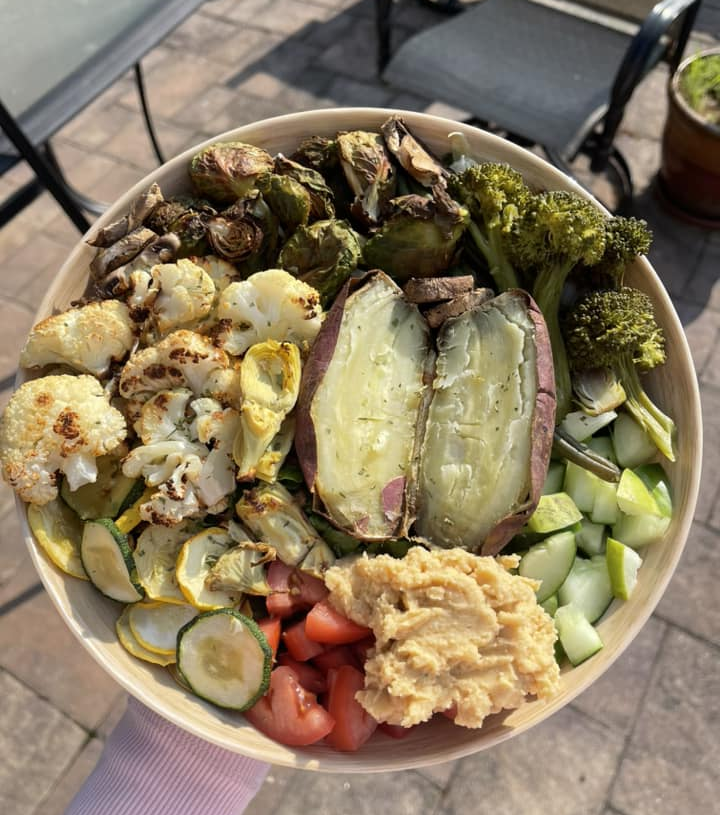FOR THE HUMMUS:
1 can chickpeas, drained and rinsed
2 heaping tablespoons tahini
1/ 4 teaspoon salt
1 clove garlic
1 tablespoon olive oil
1 lemon, juiced
FOR THE VEGETABLES:
1 teaspoon garlic powder
1 teaspoon smoked paprika
1 teaspoon olive oil
1/ 2 cup canned chickpeas, drained, rinsed and patted dry
1 small sweet potato, chopped
1 cup broccoli florets and stems
FOR THE VEGETABLES
METHOD:
STEP 1
Preheat the oven to 450° F.
STEP 2
In a mixing combine garlic powder, paprika, olive oil, chickpeas, sweet potato and broccoli pieces, mix to combine. Roast on a lined baking sheet for 25 minutes.
FOR THE HUMMUS
METHOD:
STEP 1
Add drained and rinsed can of chickpeas to a high speed blender or food processor with tahini, salt, garlic, olive oil, the juice of 1 lemon and enough water to blend. Blend on high until completely smooth and enjoy!
Gut Health:
Plant-based diets are often associated with improved gut health due to the high fiber content from fruits, vegetables, and whole grains. A healthy gut microbiome is linked to better digestion and overall well-being.
Anti-Inflammatory Properties:
Many plant-based foods have anti-inflammatory properties, which can help in reducing inflammation in the body. Chronic inflammation is associated with various health issues, and a vegan diet may contribute to its prevention.
Sports Performance:
Contrary to the misconception that vegan diets lack protein, many successful athletes follow plant-based diets to enhance their performance. Plant-based proteins can support muscle building and recovery.
Reduced Risk of Foodborne Illnesses:
Plant-based diets eliminate the risk of foodborne illnesses associated with the consumption of undercooked or contaminated animal products.
Economic Impact:
A vegan diet can be more economical as plant-based protein sources tend to be cost-effective compared to some animal products. It may be a budget-friendly option for individuals or families.
Mindful Eating:
Adopting a vegan lifestyle often promotes mindful eating. Being more conscious of food choices and sources can lead to a healthier relationship with food and a greater appreciation for the environmental impact of dietary decisions.
Preservation of Biodiversity:
The expansion of animal agriculture often leads to habitat destruction and loss of biodiversity. Choosing a vegan diet supports the preservation of ecosystems and the protection of various species.
Culinary Diversity:
Veganism introduces individuals to a diverse range of cuisines and ingredients from around the world. Exploring plant-based cooking can be a culinary adventure, embracing flavors and techniques from different cultures.
Reduced Antibiotic Resistance:
The use of antibiotics in animal farming contributes to the rise of antibiotic-resistant bacteria. Opting for a vegan diet can be a way to reduce the demand for such practices and promote responsible antibiotic use.
Cruelty-Free Beauty and Personal Care:
Veganism extends to beauty and personal care products. Choosing cruelty-free, vegan alternatives ensures that your lifestyle aligns with ethical choices beyond just dietary preferences.
